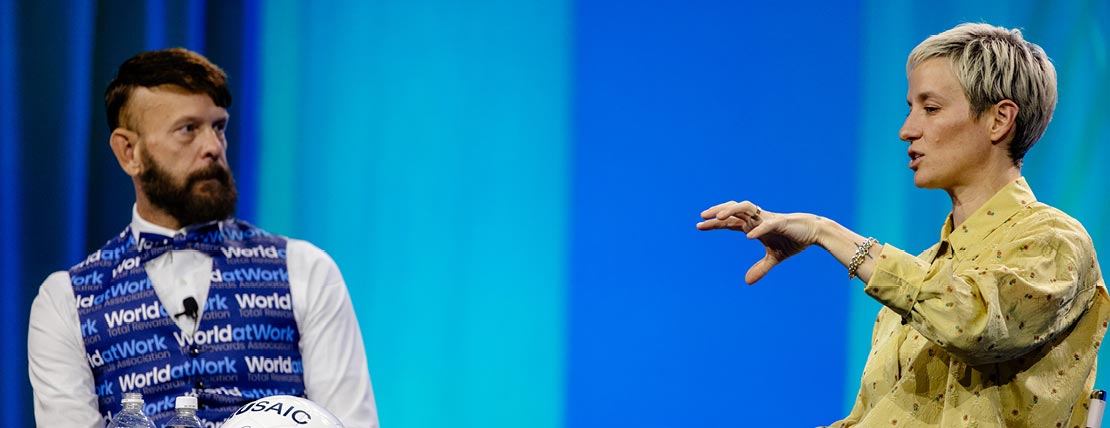- Changing the game. U.S. Women’s Soccer Team’s pay equity lawsuit against the U.S. Soccer Federation (USSF) led to a historic agreement in 2022 on a new 50-50 split that pays women and men on the national soccer teams the same salary and prize money.
- Shift in management. As a result of the pay equity lawsuit, there has a been a big shift in the USSF leadership with more women in the workplace and in management.
- Action steps. There are several steps TR leaders can pursue and enact to create meaningful change on pay equity, such as providing a transparent environment, working on successful collaborations and establishing a narrative.
“So much of life just happens,” Megan Rapinoe shared during her session as the opening keynote speaker at WorldatWork’s Total Rewards’24 conference Monday morning in Cincinnati.
In some ways, Rapinoe’s statement reflects the natural. As a global soccer star, her innate — and uncanny — ability to see what was happening around her, understand the available options and react decisively culminated in an athletic career that included two World Cup championships, two Olympic medals (including a gold at the 2012 Games) and the designation as the world’s best women’s player in 2019. In September 2023, Rapinoe retired after 17 seasons with the national team.
In other ways, though, it reflects the opposite. For decades, many in business leadership positions have reacted and acted as if workplace inequities just happened — as if they were the byproducts of a system they did not create and could not control. In this area, though, Rapinoe has also been a game-changing figure. She was a primary player in the pay equity lawsuit brought by the U.S. Women's National Soccer Team (USWNT) against the U.S. Soccer Federation (USSF), which led to a historic agreement in 2022 on a new 50-50 split that pays women and men on the national teams the same salary and prize money.
Rapinoe, who has spoken at previous WorldatWork events, shared with the Total Rewards’24 audience that what brought pay practices to this point — in sports and in business — doesn’t have to happen this way going forward.
As an anecdote, she mentioned the children of a family friend. “These two kids — maybe 8 and 11 years old — are just finding out that ‘equal pay’ is not equal for everyone,” she said. “They are finding out about inequities in pay, and they are like, ‘What? This makes no sense at all. How can this be?’ We are like, ‘I know, this is crazy.’”
Today, research from the U.S. Department of Labor’s Bureau of Labor Statistics shows women make, on average, 84 cents for every $1 earned by men, and this pay gap is even wider for women of color, who earn, on average, just 68 cents for every $1 earned by a white man.
Rapinoe and many others stand firm in the belief that pay inequity shouldn’t “just happen.”
Through changes as in those brought forth by the USWNT, youth and today’s workers and leaders “are now seeing a different world with different possibilities.”
What Happens Next?
Organizations and their total rewards professionals have the chance to see what is occurring, understand the available options and react decisively.
What if your organization decides to let this ball pass through and change does not occur? Rapinoe used the case of USSF leadership as an example.
As a result of the pay equity lawsuit, “A lot of people who were in management at the time aren’t there anymore,” she said. “They either resigned or were fired or pushed out. I think there is a big shift in the relationship between the players [the workforce] and the management. There are so many more women in the workplace, in management. [As women and as workers,] we need to tell our story and put our imprint going forward. The top is being taken off us. Change or die off? There are other options [for leaders] here.”
Rapinoe provided several steps to help TR leaders pursue and enact meaningful change on pay equity.
- Understand that equity can be a natural and healthy thing. “[The possibility of equity] has always been there, but there has been that thumb on the scale. With that taken off, what is existing can get a little sunlight and get a little water. We have always been here and been primed, but we are in a moment. Hopefully, [what is occurring] is much longer than a moment. No one has to die [seeking equity]. It just takes an attitude change.”
- View equity from a holistic perspective. “One thing I wanted to do in my book [“One Life”] was share how intersectional everything is. One inequity [e.g., gender] gives you a vantage point on other inequities [e.g., race, sexual orientation]. We are so much more alike than we are different. … How can we use this platform to talk about equal pay from a much broader sense?”
- Step forward and talk about it. “I think talking about it and finding your community around it is big. If you are in a more advantageous position — for example, if you are a man, if you are white, if you are in a higher position or management — be the one to start the conversation and start the community. Having a much more transparent environment is [foundational]. From there, you can start building alliances and sharing things, sharing experiences from different workplaces. I feel like the more things are kept in the dark and kept secret, the more the natural flow of inequality is going to exist. These things are kind of running in the background automatically. That kind of inequality will continue to exist and persist if we don’t talk about it or bring it to the forefront or make it a taboo thing.”
- Collaborate to envision what’s possible. “[For the UWSNT,] I think we’ve really worked together a lot, including with the president of U.S. Soccer right now, to get together and understand that we both have the same goals in the end. We both want to be successful commercially. We want to be successful on the field. And, we want to win championships. We have been able to collaborate a lot more. I said this during our fight with them. You could have all of us fighting with you for the same thing. You could be making more money. Is that enticing? That’s enticing to me.”
- Have someone responsible for equity advancement. “It’s such a multilayered issue. Having someone whose sole focus is equity can be so important. What we did was so important because it [put a face — or faces] to what we were talking about.”
- Establish the narrative. “The storytelling is so important. The story can help take people toward solutions that you are working on. We understood quickly that this was becoming a lightning rod and a narrative that others could grab onto. I think so many people saw their story in us or saw something similar in us.”
- Make slow, steady gains. “I would tell the managers or the bosses that this isn’t a problem that is either there or it is not. It is going to continue to exist — whether it’s sexism, racism, homophobia, etc. How do we approach it so we are making those marginal gains? Keep reminding people and keep chipping away at it. There’s no home run you can hit that just solves everything. These problems are structural. They are longstanding. It affects how people think, their biases. That takes a long time and takes a concerted effort across areas throughout the company to address something like that.”
Editor’s Note: Additional Content
For more information and resources related to this article, see the pages below, which offer quick access to all WorldatWork content on these topics:








